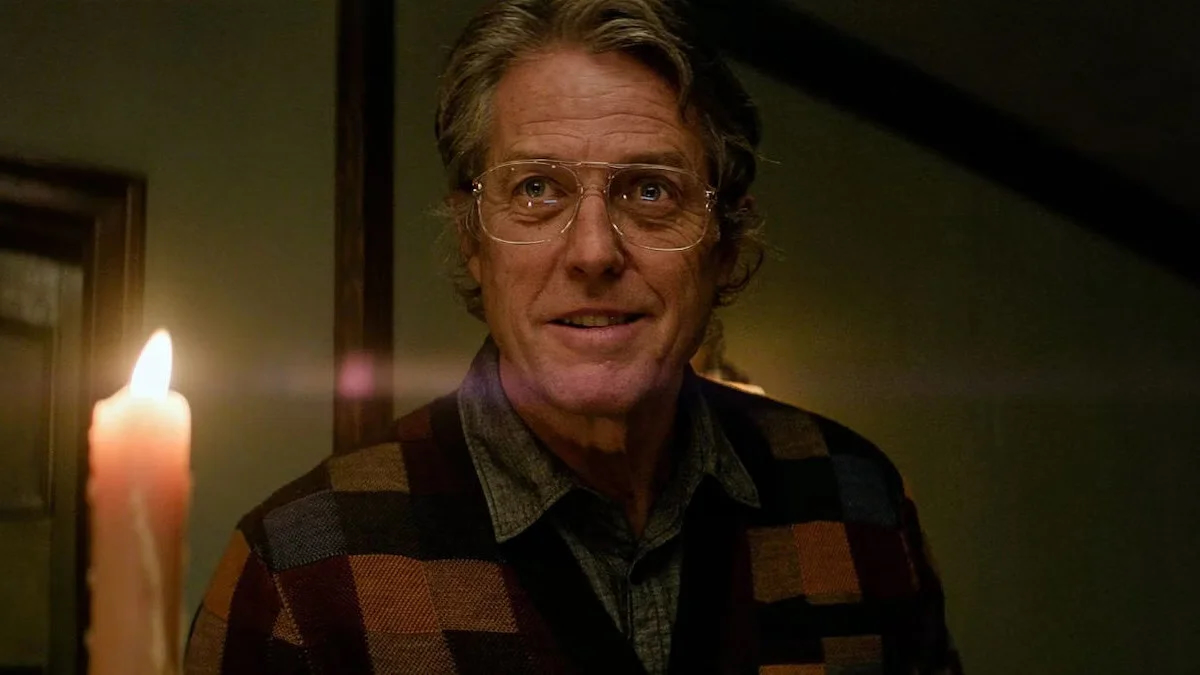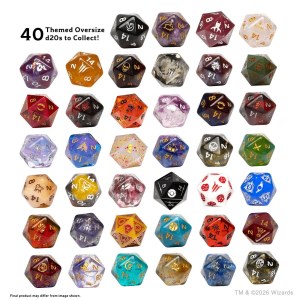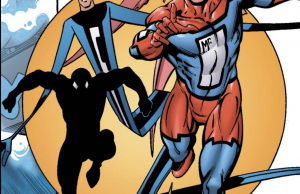
The thing—the one gnawing, irreconcilable thing—about religion is you never get to see “the truth,” which you’re told repeatedly exists just beyond your senses of sight, hearing, and touch. Instead you are asked to think of the answers as a great mystery someone else has solved for you, and you must take their word for it as a matter of faith. The appeal of Scott Beck and Bryan Woods’ Heretic is a little bit like that too.
You don’t see what exactly is at the end of its central game, its own great mystery, but you’re left with the unwavering trust that it is there. After all, the film has Hugh Grant as its ambassador, its shepherd, guiding us all to the presumably glorious promised land of horror cinema. And believe me, he is absolutely spellbinding in his indoctrination.
For some context, Grant plays Mr. Reed, a congenial and friendly gent of a certain age living in a remote cabin far from town. It is there where two young Mormon missionaries, Sister Barnes (Sophie Thatcher) and Sister Paxton (Chloe East), are lured. Before leaving, the young women are told they have a prospective convert in want of some proselytizing. And when they arrive, he certainly seems eager that evening, holding the door in one hand and a kettle of tea in the other. It matches his cozy sweater as he smirks at the Christians caught in a godforsaken thunderstorm.
Sisters Barnes and Paxton’s training teaches them better than to enter the home of a strange man without a woman present, but Mr Reed, dapper dan that he is, says his wife is making a pie in the kitchen. In fact, you can smell it from here. So inside they go, ready with their talking points about the wonders of Joseph Smith, but unready for an erudite debate with a man who wants to immerse two teenagers into an advanced course of comparative ancient religions.
As his metaphors for the unsatisfying nature of organized belief grow, so too do Barnes’ suspicions, who unlike Paxton was originally raised outside the Church of Jesus Christ Latter Day Saints and is a bit more wary of leering men eager to explain philosophy and history to her. Also where is this dude’s wife? That’s when she notices the blueberries they smell are emanating from a scented candle.
The sadistic playfulness of Beck and Woods’ conceit is how both immediate the menace is, yet slow-boiling the realization comes. The ill bent of Mr. Reed’s intentions for these young women arrives fairly rapidly, even as its shape remains elusive. Amusingly so, at times. In the short-term, what Reed primarily desires is an intellectual debate about the virtues of “belief” versus skepticism, or “disbelief”—as indicated when he marks two doors with exactly those words.
Yet the fact he is doing this in front of two frightened and grimacing girls belies the malice in his lecture. They are no more prone to a theological treatise than they are likely to find salvation when Reed promises, always smilingly, that one door will lead to freedom and the other… to, well, something best not discussed in polite company. It’s terrifying, but also thrilling due to a masterclass in fiendishness from Grant.
Heretic comes at an interesting point in the British thespian’s career. Perhaps more than any other actor of the 1990s and 2000s, Hugh Grant was once synonymous with charm. His affected diffidence and awkwardness were counterintuitive, with each quality only greater emphasizing emphasizing his innate charisma. But the thing about charisma is it can lead you down wicked roads, particularly when religion is concerned.
Heretic is by no means the first film to realize that in his advancing years, Grant’s appeal can be perverted into something diabolical. But it is the best use of that subversion to date. While Grant has enjoyed drolly chewing scenery as a family film heavy in Paddington 2, and being the one redeeming thing as a motormouth gangster in Guy Ritchie’s turgid The Gentlemen, it is in Mr. Reed that Grant at last finds a villain whose vices match the virtues of, say, a bookshop owner on Notting Hill.
Mr. Reed is learned, ingratiating, and able to mask his towering contempt for matters of faith and religion with the persuasiveness of the Devil. The character’s ability to tempt doubt, at least in the tenets of faith provides Heretic with its greatest strength.
So often the subgenre of “religious horror” can be summed up as the secular world being invaded by the superstitious, or at least spiritual, world of ages long past. It is the sickening realization that a literal demon has possessed little Linda Blair, and there’s not a damn thing a doctor can do to save her; or that Mia Farrow is being forced to carry the Antichrist to term by the men in her life. By contrast, it is the faithful and devout who are now being threatened with spiritual, and physical, annihilation by a rationalist who has turned disbelief into a fundamentalism.
Which is not to say Heretic is particularly for or against religion. The film rather seems content to set up its church in the space between. And the movie is at its strongest while residing there, with the audience as off-balanced as poor Sisters Paxton and Barnes about what lies behind those goddamn doors.
The effect of this philosophical dialogue also only works as well as it does due to the sharply drawn performances by Thatcher and East. Both actresses were apparently raised in the Mormon religion and bring an authenticity that extends beyond simply knowing the prayers by heart. While Barnes is definitely the worldlier of the two characters, neither woman is depicted as a fool, even if Paxton is certainly more sheltered. They’re smart and observant in a movie likewise shrewd enough not to patronize either their religion, gender, or youth, even a the dread elicited by Mr. Reed stems from his ability to condescend to all three qualities while turning “mansplaining” into a graduate level course.
For much of Heretic’s running time, the interactions between Reed, Barnes, and Paxton carries the meatiness of a tense stage play wherein the horror comes purely from what is being said—and what is not. The knowledge that Beck and Woods’ previous screenplays include the original, spartanly written A Quiet Place makes Heretic’s ability to derive terror from dialogue—and the stolen glances between Paxton and Barnes as they feel out what to do next—further enhances Heretic’s verbal qualities.
It also betrays Heretic’s eventual third act problems when we get beyond that door, and perhaps a few more levels down in the film’s rather twisty narrative. While Heretic has a deliberate intellectual thrust, Beck and Woods still remain ultimately populist filmmakers who created for John Krasinski the perfect setup for a crowdpleaser like A Quiet Place. Heretic is similarly determined to reach maximalist entertainment value, even at the detriment to its own cunning.
The revelations Barnes and Paxton discover behind the door they eventually select definitely answers all questions, and often in a more sensationalist and pat way than some viewers, including this one, might prefer. And while the ending of the movie remains open for interpretation and debate, the overall resolution proves once again that it is scarier not knowing what is on the other side where religion intrudes.
Nevertheless, Heretic will indeed please almost any crowd who walks through its welcoming doorway, be they devout or exceedingly agnostic. First and foremost, it is a wicked entertainment, emphasis on entertainment. And like any alluring faith, it keeps you hooked while in search of that final absolution.
Heretic opens in the U.S. on Nov. 8 and in the UK on Nov. 1. Learn more about Den of Geek’s review process and why you can trust our recommendations here.
The post Heretic Review: That Hugh Grant Is a Devil appeared first on Den of Geek.











